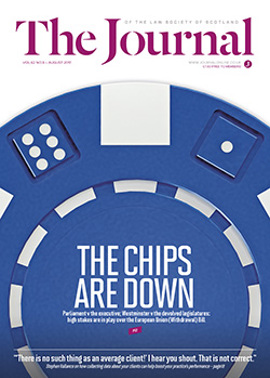Pensions: a formula rewritten
Family briefing: the UK Supreme Court has overturned the Inner House ruling on calculating periods of scheme membership for purposes of pension sharing, but will it have much impact in the end result?

FAMILY
ANNA MAITLES, SENIOR SOLICITOR, MORTON FRASER LLP
The eagerly anticipated Supreme Court judgment in McDonald v McDonald [2017] UKSC 52 was issued on 26 July. The appeal was allowed and we finally have an answer on how we are to interpret the “period of the membership” of a pension arrangement in the context of apportioning the value of a pension for the purposes of separation and divorce.
Background
The Family Law (Scotland) Act 1985 seeks to divide the assets of the marriage (“matrimonial property”) fairly on divorce.
Pensions are often valuable assets of a marriage and regularly fall within the definition of matrimonial property. However, the question of how much of a particular pension is in the “pot” for division is not always straightforward. This was the issue in McDonald.
The value attributed to a pension for divorce purposes is the cash equivalent transfer value (CETV), calculated as at the relevant date (usually the date of separation). The CETV sometimes
requires to be apportioned to ascertain how much of the pension is matrimonial property.
requires to be apportioned to ascertain how much of the pension is matrimonial property.
Regulation 4 of the Divorce etc (Pensions) (Scotland) Regulations 2000 sets out the formula for apportioning pensions: A x B/C, where A is the CETV at the relevant date; C is the period of membership of a party in the pension arrangement before the relevant date and B is the period of C which falls within the period of the marriage before the relevant date.
Over the years, there has been uncertainty about how this is to be interpreted. The regulation does not provide guidance on what the “period of membership” is, giving rise to the question whether we should understand this to be only “active membership” of a pension (when someone is contributing to their pension), rather than “full membership”.
McDonald v McDonald
Mr and Mrs McDonald married in March 1985. Mr McDonald had been a member of an occupational pension scheme for a number of years pre-marriage. In August 1985 he retired on the grounds of ill health, ceased contributing to his pension and started receiving pension income. He therefore contributed towards his pension for only five months during the marriage. The couple separated in 2010, at which point Mr McDonald’s pension was worth £172,748.
Mrs McDonald argued that the vast majority (£138,534) of Mr McDonald’s pension fell within the definition of matrimonial property, as he had been a member of the scheme for 25 years during the marriage. However, Mr McDonald argued that only the part attributable to the five-month period when he was actively contributing to his pension during the marriage (worth £10,002) was matrimonial property.
At first instance, Sheriff Holligan agreed with Mr McDonald that only “active membership” should be taken into account. On appeal the Inner House, by a majority, also found in his favour. The main rationale in both decisions was that this was in line with the ethos of the 1985 Act that matrimonial property is defined as assets which are “acquired” during the marriage but before the relevant date. The Supreme Court has now overturned this ruling. It held that “period of membership” is the whole period of membership in the pension arrangement regardless of whether contributions were made during the marriage. The court’s reasoning focused on a number of factors, including the intention behind the drafting of the 2000 Regulations and the 1985 Act.
Impact going forward?
It is important to note, as Lord Hodge does in the Supreme Court judgment, that the interpretation of the formula does not mean that the value of an interest in a pension must be shared equally. Matrimonial property should be shared “fairly”, but fair division is not necessarily equal division. Unequal division can be justified by a number of factors (as set out in ss 9(1) and 10(1) of the Act). These factors can be used to persuade the court that the fairest way to divide the matrimonial property is an unequal division. Section 10(1) recognises that there may be “special circumstances” that justify unequal division, one possible factor being the “source of funds” of an item of matrimonial property.
The McDonald case has been remitted to the sheriff court. While £138,534 of Mr McDonald’s pension will be regarded as matrimonial property, it will be within the sheriff’s discretion to decide whether to divide the matrimonial property unequally in such a way that gives him some credit for the contributions made prior to the marriage. The net result may end up being not too different than it might have been had the Supreme Court dismissed the appeal.
Share this article
In this issue
- Remedying problems with remedies
- Asperger’s syndrome and the workplace
- Foundation for a career
- Bereavement – beyond the policy
- Reading for pleasure
- Opinion: Lorna Richardson
- Book reviews
- Profile
- President's column
- DPA – streamlined from start to finish
- People on the move
- Playing for high stakes
- Lawyers at bay
- The Power of Numbers
- Future Property Auctions sees growth in troubled times
- Never a dull moment
- Family firm stands on its record
- Keeping regulators right
- Public benefit
- LEAP 365
- What to do if you're raided!
- Extradition, state assurances and article 3
- Taylor Review: an opportunity lost
- Pensions: a formula rewritten
- Same sex, same pension
- Scottish Solicitors' Discipline Tribunal
- Lease rights and the Digital Economy Act
- Extract title sheets or Registers Direct?
- A new ball game
- Walk for Access to Justice!
- Law reform roundup
- Running the SPA for you
- Handle complaints like a pro
- Cloud reformed
- Analyse this
- AML: Risk and the New Rules
- Ask Ash
- Court IT – the users' view
- Q&A corner






